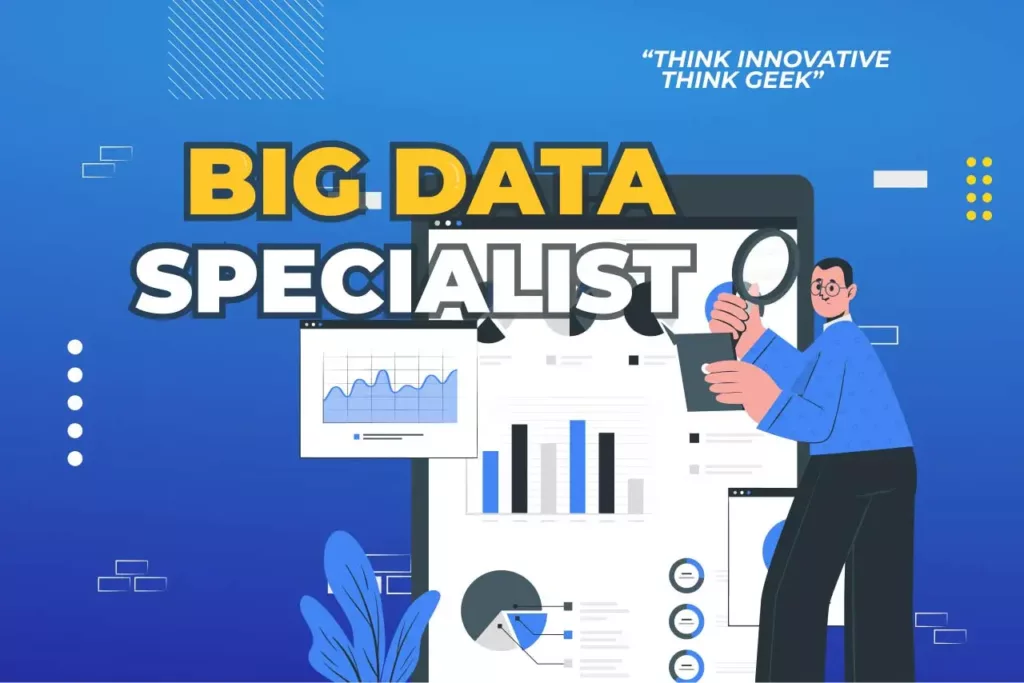In this fast-paced digital era, big data has become a crucial pillar in decision-making across various industries. Data collected every second from human and machine activities can provide extremely valuable insights for companies. This strategy is carried out by professional experts, known as big data specialist, who are responsible for identifying business opportunities.
In this article, you will learn about the roles of big data specialists and the challenges they face. Let’s dive into the following article!
What is a Big Data Specialist?
A big data specialist is a professional skilled in collecting, processing, analyzing, and reporting data on a large scale. They play a key role in helping companies make the most effective use of data. Additionally, they are responsible for ensuring data security and protecting sensitive information privacy.
Big Data Specialist’s Responsibilities
A big data specialist is responsible for gathering data from various sources. What exactly are the tasks of a big data specialist? Here’s a breakdown:
1. Data Collection
The first task of a big data specialist is to gather, process, and analyze data. This data can come from online transactions, social media interactions, IoT devices, or even sensor data. The data is then stored on computing platforms capable of handling large volumes.
2. Data Processing and Management
After collecting the data, the next step is to process and manage it. Big data specialists must use computing platforms and management systems specifically designed to handle large volumes of data.
3. Data Analysis
Analysis is at the heart of a big data specialist’s job. By using statistical techniques and advanced algorithms, they uncover patterns, trends, and relationships that are not apparent in raw data.
4. Data Security
Data security is a vital aspect of a big data specialist’s job. They must ensure that the data they handle is secure from both external and internal threats. This job involves the use of encryption technology, firewalls, and adherence to strict security protocols.
5. Data Reporting and Visualization
Big data specialists are also tasked with presenting analysis results in an easy-to-understand format. This task is often done through data visualization, using charts, graphs, and interactive dashboards to make it easier for management to comprehend the insights generated.
Skills of a Big Data Specialist
In addition to their responsibilities, what skills must a big data specialist possess? Here are some of the essential skills for a big data specialist:
1. Understanding of Big Data Technology
One of the tasks of a big data specialist is understanding technologies related to big data, such as Hadoop, Spark, and other cloud computing platforms.
2. Knowledge of Statistics and Data Analysis
The ability to analyze data and use statistical methods is a fundamental skill for a big data specialist.
Big data specialists must be proficient in programming languages such as Python, R, and SQL. These programming skills are necessary for processing and manipulating data with specialized algorithms.
4. Creativity and Problem Solving
Solving complex problems requires creativity, especially when working with large and diverse data. Big data specialists must be able to find innovative solutions when facing technical challenges.
5. Communication and Collaboration Skills
Clear and effective communication is essential in this role. Big data specialists often work with cross-division teams, such as management, marketing, and IT. Good collaboration skills will help them present analysis results in a way that is easy for everyone to understand.
Challenges for Big Data Specialists
Now that you understand the tasks and skills required for a big data specialist, what challenges do they face?
1. Managing Large Data Volumes
One of the main challenges is managing the ever-growing volume of data. As technology advances, the amount of data that big data specialists must handle increases. Therefore, big data specialists need advanced storage and processing technology.
2. System Integration Complexity
Integrating various systems that generate data can be a challenge. Big data specialists must ensure that all systems work well and that the data generated can be analyzed effectively.
3. Data Analysis Skills
In addition to mastering technology, big data specialists must also have deep data analysis skills. They must be able to interpret data accurately and provide reliable insights for decision-making.
4. Handling Various Data Types
The data faced by big data specialists is not always structured. They often have to work with unstructured or semi-structured data, such as text, images, and videos.
5. Data Security and Privacy
Security and privacy are top concerns in data management. Big data specialists must always be alert to potential data breaches and ensure that sensitive information is protected.
6. Rapid Technological Change
Big data technology is constantly evolving, and a big data specialist must keep up with the latest trends to remain relevant in the field. This demands continuous learning and adaptation to new tools.
7. Data Quality and Accuracy
Poor data quality will result in inaccurate analysis. Big data specialists must always check the quality of the data they use and clean it of errors or anomalies.
8. Lack of Support from Management
Often, management may not fully understand the importance of big data, making them reluctant to provide the necessary resources. This can be an obstacle to implementing data-driven strategies.
9. Challenges in Data Visualization
Presenting data in an easy-to-understand visual format can be a challenge, especially when the data being analyzed is highly complex. Big data specialists need to use appropriate visualization tools to simplify interpretation.
How to Overcome Challenges for Big Data Specialists
Big data is not just about large volumes of data but also about the challenges of managing and utilizing information effectively. Here are solutions for overcoming the challenges for Big Data Specialists:
1. Skill Development
Addressing challenges requires continuous skill development. Big data specialists must constantly update their knowledge of new technologies and tools.
2. Using the Right Technology
Choosing the right technology for managing and analyzing data is key to success. By using appropriate computing platforms and collaboration tools, big data specialists can work more efficiently.
3. Improving Collaboration with Other Divisions
Good collaboration with other teams in the company helps big data specialists better understand business needs.
4. Ensuring Compliance with Regulations
Big data specialists must always pay attention to applicable regulations related to data management, including privacy protection and information security.
That’s a comprehensive explanation of the responsibilities and challenges faced by big data specialists. As previously explained, Big Data Specialists play a crucial role in the modern business world.
With the right skills and appropriate technology, these challenges can be overcome to provide added value to your company.

Therefore, GeekGarden offers big data services that can help you grow your business. If you’re interested in learning more about our big data services, feel free to contact us through GeekGarden’s contact page now!
Author: Sari Dewi (Content Writer)
Editor: Helmi Maulidina (SEO Specialist)















